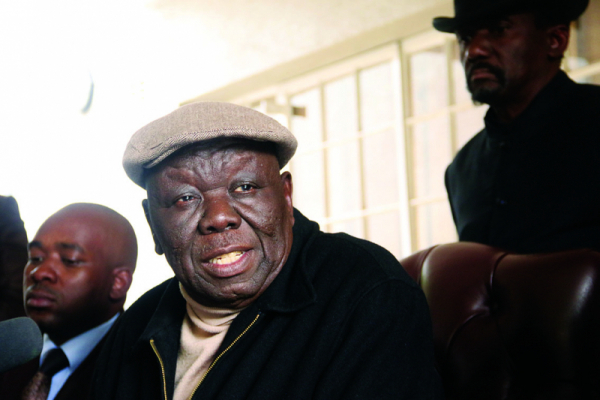
ZIMBABWE’S main opposition leader, Morgan Tsvangirai, has died. The former trade union leader succumbed to colon cancer at a private South African hospital yesterday, aged 65.
BY ZERUBABEL MUDZINGWA
Tsvangirai’s spokesperson Luke Tamborinyoka confirmed the tragic news last night, saying “our democratic icon is no more”.
“The MDC-T and Zimbabwe as a whole have been left poorer with his death,” he said.
Tamborinyoka described Tsvangirai as the face of opposition politics in Zimbabwe and the MDC-T.
One of Tsvangirai’s deputies, Elias Mudzuri, in a tweet last night, wrote: “As you are aware that our MDC-T president Dr Morgan Richard Tsvangirai has not been feeling well for some time, it is sad for me to announce that we have lost our icon and fighter for democracy. Our thoughts and prayers are with the family, the party and the nation at this hour.”
Tsvangirai, who served as Prime Minister of the coalition government between 2009 and 2013, had battled with colon cancer for at least two years, before his condition took a nosedive early this week, resulting in him being taken to the hospital’s intensive care unit.
His death, which came just a few months before the 2018 general elections, has dealt a huge blow to the country’s opposition politics, where he had already been nominated as the MDC-T and MDC Alliance presidential candidate.
- Chamisa under fire over US$120K donation
- Mavhunga puts DeMbare into Chibuku quarterfinals
- Pension funds bet on Cabora Bassa oilfields
- Councils defy govt fire tender directive
Keep Reading
News of Tsvangirai’s death has also triggered fears that the MDC-T could split given the fierce fighting that had already engulfed the opposition party in the last few weeks with his three deputies — Nelson Chamisa, Mudzuri and Thokozani Khupe — all fiercely jostling to succeed him.
The MDC-T founding leader died a few hours before his party’s national council and executive council were due to meet to resolve the fierce fights centred around his successor.
Before his latest hospital readmission, Tsvangirai had appointed Chamisa to represent him at the MDC Alliance, giving his youthful lieutenant an edge over Mudzuri and Khupe, although his “heir apparent” was facing fierce resistance from some top MDC-T officials.
The MDC Alliance is a broader coalition of seven political parties formed last year to take on Zanu PF.
The former trade union leader publicly disclosed his health condition in 2016, becoming the second top Zimbabwean politician to open up on his health after the late Vice-President Joshua Nkomo, who also went public that he was battling with prostate cancer before he died in 1999.
However, it is his arduous political journey against the well-oiled Zanu PF machinery that made Tsvangirai an iconic figure within and outside the country after he mobilised workers, churches, business, women’s and students’ organisations and other interest groups and formed the MDC in 1999.
Despite fierce intimidation targeted at his person and his supporters, Tsvangirai built a formidable opposition party that gave former President Robert Mugabe hard times and came close to winning power in parliamentary elections in 2000 and in a presidential vote in 2002.
In 2008, he gave Mugabe another headache when he won the first round of the presidential race, but fell short of gaining the majority vote to be declared winner.
He, however, later pulled out in the second round in protest over persecution of his supporters by ruling party supporters aided by the military and war veterans.
Tsvangirai later grudgingly joined a unity government that lasted until the 2013 election, which Mugabe again won amid reports of massive rigging.
Tsvangirai’s leadership was, however, not without glitches, as he saw his party split three times during his tenure with all the breakaway factions blaming him for exhibiting dictatorial tendencies, although at the time of his death he had managed to bring them back under one tent, MDC Alliance.
A leaked United States diplomatic cable also seemed to confirm the allegations, describing him as “a flawed figure, not readily open to advice, indecisive and with questionable judgment”.











